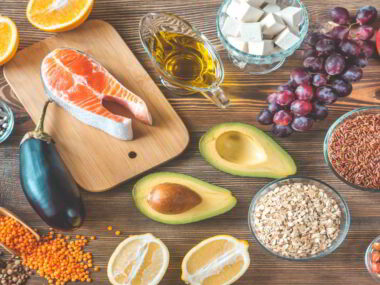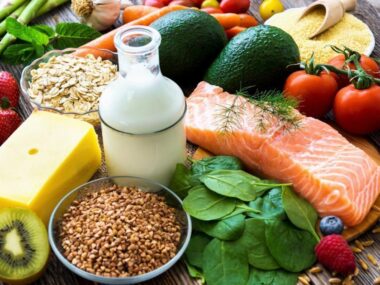The Atkins Diet is a low-carbohydrate, high-fat diet that was made popular in the 1970s by Dr. Robert Atkins. The diet is based on the thought that by reducing your carbohydrate intake and increasing your fat and protein consumption, your body will enter a state of ketosis, where it burns fat for energy instead of carbohydrates.
There are Four Phases of The Atkins Diet
Induction Phase
This is the most restrictive phase, where you limit your carbohydrate intake to 20-25 grams per day for two weeks. You can eat high-protein foods like meat, fish, and eggs, as well as low-carb vegetables like spinach and broccoli.
Balancing Phase
In this phase, you gradually increase your carbohydrate intake to 25-50 grams per day, adding nuts, seeds, berries, and other low-carb fruits and vegetables to your diet.
Fine-tuning Phase
In this phase, you continue to increase your carbohydrate intake to around 50-80 grams per day, adding more carbohydrates in the form of whole grains, starchy vegetables, and legumes.
Maintenance Phase
This is the final phase, where you maintain your weight loss and healthy eating habits for the long-term by continuing to eat a balanced, low-carbohydrate diet.
The Atkins Diet has been criticized by some health experts for its high fat content, and there is debate about its long-term safety and effectiveness. However, some studies have suggested that the diet may be effective for short-term weight loss and improving certain health markers, such as blood sugar and cholesterol levels.
Who is Atkins Diet Good For?
The Atkins Diet may be beneficial for some people, depending on their individual health goals and circumstances. Here are some groups of people who may find the Atkins Diet helpful
- People with Obesity: The Atkins Diet may be effective for weight loss, especially in the short-term. The low-carbohydrate, high-protein, and high-fat nature of the diet can help people feel full and satisfied, which may lead to a reduced calorie intake.
- People with Type 2 Diabetes: Some studies have shown that the Atkins Diet may help improve blood sugar control and reduce the need for medication in people with type 2 diabetes.
- People with Metabolic Syndrome: Metabolic syndrome is a group of conditions that includes high blood pressure, high blood sugar, and high cholesterol levels. The Atkins Diet may help improve these markers and reduce the risk of heart disease.
- People with Certain Neurological Conditions: The ketogenic version of the Atkins Diet (where carbohydrate intake is severely restricted) has been used to treat certain neurological conditions such as epilepsy and Parkinson’s disease.
However, it’s important to note that the Atkins Diet may not be appropriate for everyone. For example, people with kidney disease or other health conditions that require a restricted diet should speak with their doctor before starting the Atkins Diet. Additionally, the Atkins Diet may not be sustainable or enjoyable for some people in the long-term.
What to Eat and Avoid in The Atkins Diet
Here’s a brief overview of what to eat and what to avoid on the Atkins Diet:
Foods to Eat:
- High-protein foods like meat, poultry, fish, and eggs
- Low-carbohydrate vegetables like spinach, broccoli, cauliflower, and asparagus
- Nuts and seeds (in moderation)
- Low-sugar fruits like berries (in moderation)
- Healthy fats like olive oil, avocado, and nuts
Foods to Limit or Avoid:
- High-carbohydrate foods like bread, pasta, rice, and sugary snacks
- Processed and packaged foods, which often contain added sugars and refined carbohydrates
- Starchy vegetables like potatoes and corn
- High-sugar fruits like bananas, grapes, and mangoes
- Sweetened beverages like soda and juice
It’s important to note that the amount of carbohydrates you can eat on the Atkins Diet depends on the phase you are in. During the initial Induction Phase, carbohydrate intake is limited to 20-25 grams per day. As you progress through the phases, you can gradually increase your carbohydrate intake, but it’s important to stick to the recommended levels for each phase in order to achieve the desired results. It’s also important to focus on consuming nutrient-dense whole foods rather than processed and packaged foods, which can be high in unhealthy fats, sodium, and artificial ingredients.
Can Vegetarians and Vegans Follow the Atkins Diet?
Vegetarians and Vegans can follow the Atkins Diet, but it may be more challenging as the diet is typically high in animal-based protein. However, there are ways to adapt the diet to fit a vegetarian or vegan lifestyle.
For vegetarians, high-protein foods like eggs, cheese, and Greek yogurt can be incorporated into the diet. Plant-based protein sources like tofu, tempeh, and legumes can also be added. Low-carbohydrate vegetables like spinach, broccoli, and cauliflower can be used as the base of meals.
For vegans, plant-based protein sources like tofu, tempeh, seitan, and legumes can be used. Low-carbohydrate vegetables like spinach, broccoli, and cauliflower can also be used. Healthy fats like avocado, nuts, and seeds can be added to meals for satiety.
It’s important to note that the Induction Phase of the Atkins Diet may be more difficult for vegetarians and vegans, as it restricts carbohydrate intake to 20-25 grams per day and relies heavily on animal-based protein sources. However, the Balancing, Fine-tuning, and Maintenance Phases of the diet allow for a greater variety of foods and can be adapted to fit a vegetarian or vegan lifestyle.
It’s always a good idea to speak with a healthcare provider or registered dietitian before starting any new diet or nutrition plan, especially if you have specific dietary restrictions or health concerns.
Here are some Atkins-friendly snack ideas
- Hard-boiled eggs
- Turkey or beef jerky
- Raw veggies with hummus or guacamole
- Greek yogurt with berries
- Nuts and seeds (in moderation)
- Low-carbohydrate protein bars or shakes
- Cheese sticks or slices
- Cottage cheese with chopped veggies
- Low-carbohydrate veggies and dip
- Sliced deli meat with cheese
It’s important to choose snacks that are high in protein and healthy fats, and low in carbohydrates. Snacking can be a helpful way to keep hunger at bay and prevent overeating at meals, but it’s important to choose snacks that fit within your daily carbohydrate and calorie limits.
Remember that the amount of carbohydrates you can eat on the Atkins Diet depends on the phase you are in, so be sure to check the recommended carbohydrate intake for your specific phase.
A Basic Atkins Diet Shopping List to Follow
Here’s a basic Atkins Diet shopping list to get you started:
Protein:
- Beef
- Chicken
- Turkey
- Fish
- Eggs
- Greek yogurt
- Cheese
- Tofu
- Tempeh
- Legumes (for vegetarians and vegans)
Low-carbohydrate vegetables:
- Spinach
- Broccoli
- Cauliflower
- Asparagus
- Brussels sprouts
- Kale
- Bell peppers
- Zucchini
- Cucumber
- Mushrooms
Healthy fats:
- Olive oil
- Avocado
- Nuts (almonds, walnuts, pecans)
- Seeds (chia seeds, flaxseeds, pumpkin seeds)
Low-sugar fruits:
- Berries (strawberries, blueberries, raspberries)
- Avocado (technically a fruit!)
Others:
- Herbs and spices
- Vinegar
- Sugar-free sweeteners (stevia, erythritol)
- Unsweetened almond milk
- Coffee and tea
- Water
It’s important to read food labels and choose foods that are high in protein, healthy fats, and low in carbohydrates. Avoid processed and packaged foods, which can be high in added sugars and refined carbohydrates. Remember that the amount of carbohydrates you can eat on the Atkins Diet depends on the phase you are in, so be sure to check the recommended carbohydrate intake for your specific phase.
This is just a basic shopping list, and there are many other foods that can be included in an Atkins Diet. It’s always a good idea to speak with a healthcare provider or registered dietitian to create a personalized nutrition plan that meets your individual needs and preferences.
Tips for Dining Out When You’re on Atkins
- Check The Menu Ahead of Time: Look for the restaurant’s menu online and plan what you’ll order in advance. This can help you avoid being tempted by high-carbohydrate options and ensure that you choose a meal that fits within your carbohydrate limit.
- Choose Protein-Based Options: Look for dishes that are high in protein, such as grilled meat or fish. Avoid dishes that are breaded or fried, as these can be high in carbohydrates.
- Ask for Substitutions: Many restaurants are happy to make substitutions to accommodate dietary restrictions. For example, you could ask for a salad instead of fries or for extra vegetables instead of bread.
- Avoid Sugary Drinks: Stick to water, unsweetened tea, or coffee. Avoid sugary drinks like soda and juice, which can be high in carbohydrates.
- Be Mindful of Sauces and Dressings: Many sauces and dressings can be high in carbohydrates. Ask for them on the side, or choose options that are lower in carbohydrates, such as oil and vinegar.
- Don’t Be Afraid to Ask Questions: Don’t be afraid to ask your server about the ingredients in a dish or how it is prepared. This can help you make an informed decision about what to order.
- Share a Meal: Many restaurant portions are larger than what you need, so consider sharing a meal with a friend or taking home leftovers.
Remember, the Atkins Diet is a lifestyle change, not a temporary diet. While dining out can be challenging, with a little bit of planning and mindfulness, you can make healthy choices that fit within your dietary goals.
Pros and Cons of Following Atkins
Pros of Following Atkins
- Effective Weight Loss: The Atkins Diet can lead to significant weight loss, especially during the initial phase of the diet. This can be motivating and help to improve overall health.
- Reduced Hunger and Cravings: By focusing on protein and healthy fats, the Atkins Diet can help to reduce hunger and cravings, making it easier to stick to a healthy eating plan.
- Improved Blood Sugar Control: By reducing carbohydrate intake, the Atkins Diet can help to improve blood sugar control, making it a potentially helpful dietary approach for people with type 2 diabetes.
- Increased Focus on Whole Foods: The Atkins Diet emphasizes whole, unprocessed foods, which can help to improve overall nutrition and reduce reliance on processed and packaged foods.
Cons of Following Atkins
- Restrictive: The Atkins Diet can be very restrictive, especially during the initial phase, which can make it difficult to stick to long-term.
- Low Fiber Intake: Because the Atkins Diet restricts many fruits, vegetables, and whole grains, it can be low in fiber, which can lead to constipation and other digestive issues.
- Risk of Nutrient Deficiencies: The Atkins Diet may be low in certain nutrients, such as vitamin C, folate, and potassium, if not carefully planned.
- Risk of High Saturated Fat Consumption: Depending on the specific foods chosen, the Atkins Diet can be high in saturated fat, which can increase the risk of heart disease.
- Difficult to Follow in Social Gatherings: The Atkins Diet can be difficult to follow in social situations or when eating out, which can make it challenging for some people to stick to the diet long-term.
As with any diet, there are both pros and cons to following the Atkins Diet. It’s important to speak with a healthcare provider or registered dietitian to determine if the Atkins Diet is right for you and to ensure that you are meeting your nutrient needs while following the diet.
Short- and Long-Term Effects of the Atkins Diet
Here are some short- and long-term effects of the Atkins Diet
Short-term effects
- Rapid Weight Loss: The initial phase of the Atkins Diet can lead to rapid weight loss, which may be motivating for some people.
- Reduced Hunger and Cravings: By focusing on protein and healthy fats, the Atkins Diet can help to reduce hunger and cravings, making it easier to stick to a healthy eating plan.
- Improved Blood Sugar Control: By reducing carbohydrate intake, the Atkins Diet can help to improve blood sugar control, making it a potentially helpful dietary approach for people with type 2 diabetes.
- Increased Energy: Some people may experience increased energy levels when following the Atkins Diet, especially if they have been consuming a high-carbohydrate diet prior to starting the diet.
Long-term effects
- Weight Loss Maintenance: The Atkins Diet has been shown to be effective for long-term weight loss maintenance for some people.
- Improved Cardiovascular Health: Some research suggests that the Atkins Diet may lead to improved cholesterol levels, blood pressure, and other markers of cardiovascular health.
- Risk of Nutrient Deficiencies: The Atkins Diet may be low in certain nutrients, such as vitamin C, folate, and potassium, if not carefully planned.
- Increased Risk of Kidney Stones: The high protein content of the Atkins Diet may increase the risk of kidney stones for some people.
- Increased Risk of Certain Cancers: Some studies have suggested that high intake of red and processed meats, which are often consumed on the Atkins Diet, may increase the risk of certain types of cancer, such as colorectal cancer.
As with any diet, there are both short- and long-term effects to consider. It’s important to speak with a healthcare provider or registered dietitian to determine if the Atkins Diet is right for you and to ensure that you are meeting your nutrient needs while following the diet.
Using Atkins Diet to Loose Weight
The Atkins Diet can be an effective tool for weight loss for some people, but it’s important to remember that weight loss is not the only goal of a healthy lifestyle. A balanced diet that is rich in fruits, vegetables, whole grains, lean protein, and healthy fats, along with regular physical activity, is key to maintaining a healthy weight and reducing the risk of chronic diseases.
Additionally, it’s important to approach any diet with a long-term perspective. The Atkins Diet can be very restrictive and difficult to maintain over the long-term, which may lead to weight regain and potential negative effects on health.
If you’re considering the Atkins Diet, it’s important to speak with a healthcare provider or registered dietitian to determine if it is the right approach for you and to ensure that you are meeting your nutrient needs while following the diet.
Final Thoughts
The Atkins Diet may be an effective way to lose weight and improve certain markers of health, particularly in the short term. However, it may not be appropriate for everyone, particularly those with kidney disease, liver disease, or a history of eating disorders. It’s important to consult with a healthcare professional before starting any new diet or exercise program.





